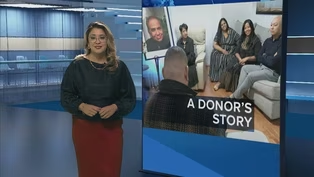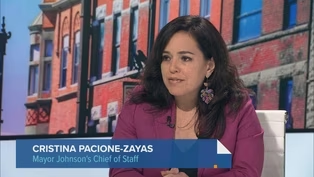Chicago Tonight: Latino Voices
Documentary Dives Into History of the Young Lords in Lincoln Park
Clip: 10/10/2024 | 7m 55sVideo has Closed Captions
The Young Lords of Lincoln Park went from a street gang to revolutionaries.
The Young Lords organized and fought against several injustices, especially gentrification. A new "Chicago Stories" documentary outlines their entire story.
Problems playing video? | Closed Captioning Feedback
Problems playing video? | Closed Captioning Feedback
Chicago Tonight: Latino Voices is a local public television program presented by WTTW
Chicago Tonight: Latino Voices
Documentary Dives Into History of the Young Lords in Lincoln Park
Clip: 10/10/2024 | 7m 55sVideo has Closed Captions
The Young Lords organized and fought against several injustices, especially gentrification. A new "Chicago Stories" documentary outlines their entire story.
Problems playing video? | Closed Captioning Feedback
How to Watch Chicago Tonight: Latino Voices
Chicago Tonight: Latino Voices is available to stream on pbs.org and the free PBS App, available on iPhone, Apple TV, Android TV, Android smartphones, Amazon Fire TV, Amazon Fire Tablet, Roku, Samsung Smart TV, and Vizio.
Providing Support for PBS.org
Learn Moreabout PBS online sponsorshipof Lincoln Park went from street gang members to revolutionaries organized and fought against several injustices, especially gentrification in a new Chicago stories, documentary outlines their entire story.
Let's take a look.
>> And the turbulence streets of 1960, Chicago, a fierce struggle unfolding.
They driving a They're killing us.
And then we want to kill On one side.
The city of Chicago.
In effect, the federal government was about to devastate their community.
On the other side, the people.
>> It was a perfect storm.
Communities were ripe for a Batman.
>> And here to talk more about the history and current activity of their work organization are lot about this.
original member of the young Lords and executive director of and Palm Yanis, the deputy chairman of the new era Young Lords.
Thank you both for joining us.
You know, I got a chance to watch some of the documentary and it's just remarkable to see that piece of history that took place in that neighborhood and no more.
I want to head back to the 1950's at that time.
Lincoln Park was known as one of the poorest neighborhoods in Chicago.
The population was mostly white until Puerto Rican started to arrive in the area.
Tell me a little bit more about your story, how you got involved with the young lords.
>> I got because obviously teenager at the time and we had communication inside live Humble Park.
And we had communications with the games and income part and that's how we became you know, we came up a point each other.
This how we started.
>> And so we were aware of what's going on in both neighborhoods.
Lincoln Park in Humble Park at the time.
But it would concentration of Puerto Rican families was really And at that point in Lincoln Park, this where everything was going on.
>> And when you started to, you know, be more involved with the young lords.
What was your role?
>> I became the minister of information for the young that simply meant that I was in charge of all the communications that were coming out of the organization slogans than most people putting out leaflets, things like that.
But, you know, we were also involved the programs, but those with a specific task that I had with that with the young lords.
>> are you officially joined the new area, young lords in 2021 and help build the Illinois chapter and through that process.
you had conversation with previous young lords, including Omar, how has your history help shape how you organize the community today?
>> So their history has helped in many different ways.
I've used it as a stepping stone to understand the systematic issues that they faced back in the 60's.
And how that relates to the work that we're still doing today.
And in many cases will say like the actors and the worried around certain havs changed.
But for the most part of the systematic structures are still there and still present in our community.
So when I look back at how the young lords had to move then and what we need to do now, it's still relevant.
We still have a food desert and food disparity.
We still have housing issues and prices.
They're still police terrorism.
I will go a little bit beyond just common police brutality because terrorism affects the mind and how you react every day.
And so it's it's a lot more complicated than just speaking out about it as brutality.
And Paul, you you mentioned that you were in high school when you learned about the young lords.
>> What attracted you to them?
So I actually went to grade school in Lincoln Park.
I went to Abraham Lincoln Elementary.
>> Which is only a couple blocks away from the old Stone academic building that was taken over in the documentary.
Going to school there.
from first grade to 8th grade I had no idea that there was Puerto Rican.
Instead, just in that community a decade earlier Sunday that looks so different.
Yes.
And so this is 85 86 around there.
>> And so when I got into high school as I got older, that's when I started to look at how.
Puerto Rican issues and and Mexican and Latino issues and also how they overlapped with a lot of the black issues and in the black community.
And so that's kind of where I started today.
try fill that connection.
Yes.
>> And are the documentary touches on several significant moments.
One in particular was a killing of an with mulls.
Another member of the young lords.
He was shot by an off-duty officer.
This tragedy led to forming alliances with other groups like the Rainbow Coalition.
With that, that moment bring forth for the young lords at that time.
Well, the killing of Monroe time was Prince was pivotal in the development of the organization because at the beginning, our chairman was having a hard time convincing the members.
>> Over the of the owners to become political, they wanted to remain in this social club, petty crime, that type of thing intention wanted to move forward.
of course, he told them why, you know, because of police brutality, terrible housing.
It wasn't until 9, 0, was killed on.
Fortunately, that's point in which the rest of the members that we're assisting change, she added, Yes, you know, this is what we have to move.
We have to move forward.
We have especially because the field they had no recourse after minor was shot and killed.
They didn't see any any action against the off-duty policeman to kill them.
So that was pivotal in the to the organization.
I think from remember being scared at that time would would you feel?
>> You know, when you leaving that situation is not this end of the year.
New not scared.
You know, you're developing ways of navigating, you know, all of That violence.
>> I think if you think back then can see we just racing, you >> But you did it.
I mean, you created health clinics fed the community.
I mean, how important was after the people in that neighborhood absolutely necessary.
We did that because there was a need for The families who are not getting adequate health care.
>> They were not having decent housing and that was it all responds.
You know, once we can political, that was a response to the needs of the community.
Will we said sure the people.
And those were the things really the young I well known for.
That was the confrontations with police, but program.
So what they did, you know and we don't have time for one other question.
But I want to go to you, Paul, what do you think the legacy of the young lords did for not only Chicago but the country?
>> The legacy for me.
It inspired a new generation.
We see that with the new era in the work that we're doing.
But it also like I said before, you could give us that stepping stone.
It allowed us to understand certain things.
And it was unique in the way where they did start off as a social And then through a series of circumstances eventually did go political.
And when you look at that and the significance our communities now in state Chicago, now you see that there is a need for that.
More young people getting politically and involved in active.
So think you're going to have to leave it at that.
He'll definitely recommend people.
>> To go watch Thank you for both of you.
Thank you.
To learn more about Chicago's history with the young Lords
How Organ Donation Impacted a Local Family
Video has Closed Captions
Clip: 10/10/2024 | 3m 54s | The Gift of Hope Organs and Tissue Donor Network is urging people to become organ donors. (3m 54s)
Mayor Brandon Johnson's Chief of Staff Talks CPS Funding
Video has Closed Captions
Clip: 10/10/2024 | 7m 52s | All eyes have been on Chicago Public Schools this week. (7m 52s)
Providing Support for PBS.org
Learn Moreabout PBS online sponsorship
- News and Public Affairs

Top journalists deliver compelling original analysis of the hour's headlines.

- News and Public Affairs

FRONTLINE is investigative journalism that questions, explains and changes our world.












Support for PBS provided by:
Chicago Tonight: Latino Voices is a local public television program presented by WTTW

